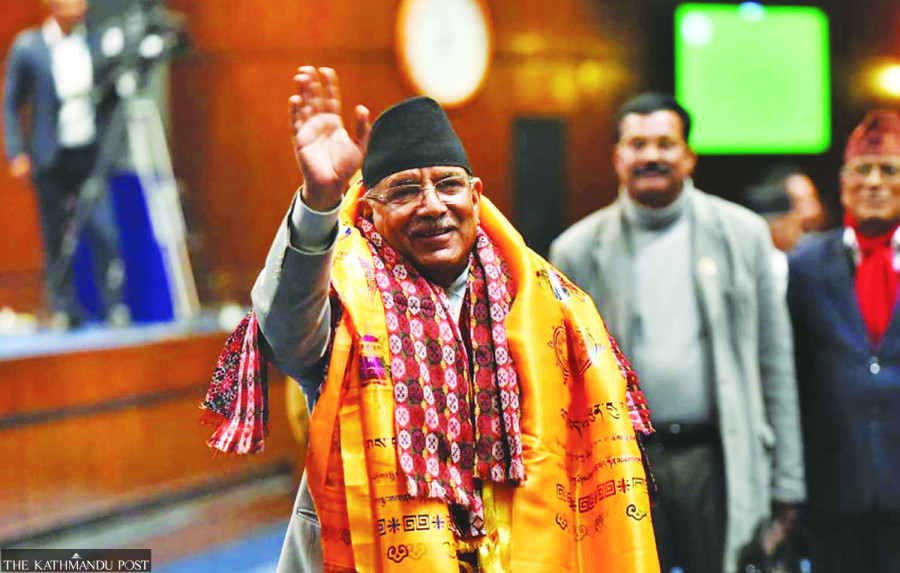Columns
No government in waiting
The idea of Dahal and Oli as rotating prime ministers could still face constitutional hurdles.
Achyut Wagle
The new government led by CPN (Maoist Centre) chairman Pushpa Kamal Dahal appears to have been formed with an unprecedented national consensus. Almost all members of the House of Representatives gave him their vote of confidence last week. Besides the seven-party coalition, the Nepali Congress and the Nepal Communist Party (United Socialist) also voted for Dahal. This defies all established norms of parliamentary democracy, suggests a constitutionally incompatible long-term political collusion and brews a recipe for instability. A parliamentary democracy without an opposition in Parliament is inconceivable. Political literature of the last 1,000 years since the Magna-Carta (1215 AD) has unequivocally established that a democracy without an opposition is prone to turn into a dictatorship. The opposition can check the arbitrary tendencies of the government, and also provide an alternative as a government-in-waiting by balancing the interests of the majority and the minority.
The recent unanimous vote for Dahal has left the House of Representatives without an opposition. The Nepali Congress has voted for Dahal, but paradoxically says it is willing to sit in the opposition, a weirdity that does not seem possible until several laws are drastically amended. Section 2 (e.1) of the Act Pertaining to Remuneration and Perks of the Office-bearers and Members of the Federal Parliament (2016) states that the leader of the opposition (in Parliament) is "the leader of the largest party, except for the one which formed the Council of Ministers or supported to form it, that has secured more than 10 percent of the seats in the House of Representatives or the National Assembly". Also, the constitution, by conferring ex-officio membership in the Constitutional Council to the leader of the opposition under Article 284, has not considered a Parliament without an opposition.
Rotating prime ministers
While forging the coalition deal, it was widely reported that Dahal and CPN-UML chairman KP Sharma Oli would take turns being prime minister. Dahal will be prime minister during the first half of the five-year term, and then vacate the seat for Oli. Politically, the deal looks like a plausible proposition, but Nepal's constitution does not provide for such an automatic transfer of power. This is one critical aspect grossly overlooked in the ongoing debate.
Dahal has been is appointed prime minister under Article 76 (2) of the constitution in his capacity as "a member of the House of Representatives who is able to command a majority with the support of two or more parties". And if the prime minister is ousted for whatever reason, Article 76 (3) will be activated, which says that "the leader of the parliamentary party which has the highest number of members in the House of Representatives" will be the next prime minister. If a prime minister appointed under Article 76 (2) relinquishes his position without giving a convincing constitutional reason, like losing the vote of confidence, reverting to the same article is improbable. This may be possible only if they combine their parties and create the single largest party in Parliament. Therefore, the proposed idea of Dahal and Oli taking turns as prime minister is not without constitutional hurdles.
Impending instability
Article 100 (4) of the constitution prevents a no-confidence motion from being tabled in the House for two years after a new prime minister is sworn in. However, under Article 100 (2), the prime minister must face a vote of confidence "in case the political party, which the prime minister represents, is divided or a political party in the coalition government withdraws its support".
Even if the smallest party in the coalition government withdraws its support, the constitution says Dahal must seek a vote of confidence within a month. Given the fragility of his seven-party coalition, the government is in a very precarious position. It is constitutionally debatable whether such a confidence motion will be required if friendly parties like the Nepali Congress and the United Socialist withdrew their support. In such a situation, the prime minister will be under moral pressure to prove he has majority support in the House. Nepali Congress president Sher Bahadur Deuba's decision to vote in favour of the confidence motion beyond established parliamentary norms has baffled many. It has been interpreted as an attempt to stake his claim on the presidency and the post of the House speaker. The risk of incessant instability is already shown by the Oli-Dahal duo's struggle to give shape to a full cabinet. There are more aspiring ministers in their parties than the number of ministries available.
In the provinces too, the power-sharing deal among the coalition partners is becoming complicated. What kind of discontent will emerge in outfits like the Rastriya Swatantra Party after the final allocation of ministerial berths will reveal new dimensions of potential instability. If the exertions in bringing out the coalition's common minimum programme is any indication, very little can be expected from this government too, which has been exhausting all its political capital for mere survival.




 20.53°C Kathmandu
20.53°C Kathmandu















